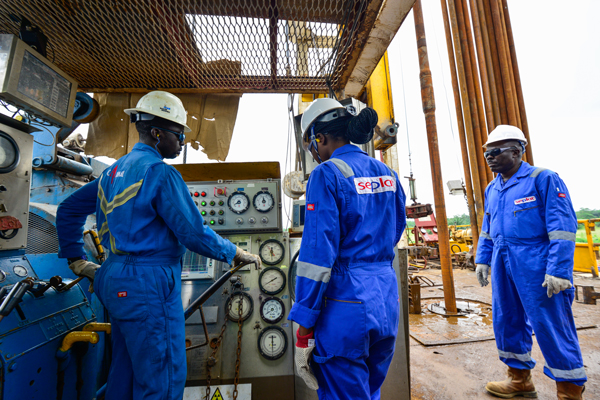•CEO Says Gas Income Hedge Against Oil Price Shock
The board of Seplat Petroleum Development Company Plc, on Wednesday, reported a terrible beginning of its operations for the 2020 financial year as presented in its first-quarter ended March 31, showing that revenue dropped by 13.35%, impairment loss stood at N47.27bn from a lean gain of N44m in the prior Q1.
The company earned N42.408bn, down from N48.941bn; while the cost of sales rose by 32.13% from N23.955bn to N31.651bn; leaving gross profit dropped by 56.96% from N24.986bn in the corresponding first-quarter of 2019 to N10.757bn.
Other income- net improved by a significant 410.99% to N15.646bn, as against the previous N5.031bn loss; while general and administrative expenses climbed 65.75% up from N6.272bn to N10.396bn; just as fair value gain stood at N6.226bn from the N3.753bn loss. Operating loss stood at N25.037bn, as against the previous N9.974bn gain.
Finance income declined from N869m to N347m; finance cost increased by 42.1% from N4.886bn to N6.943bn, resulting in net finance cost of N6.596bn, up from N4.017bn.
Loss before tax stood at N31.111bn from the previous N5.957bn profit; income tax expense of N3.516bn resulted in a net loss of N34.516bn; compared to the previous first quarter’s N4.065bn tax rebate as net profit improved to N10.022bn.
However, in a statement to the Lagos and London Stock Exchange where is listed, Seplat’s management listed factor that will reduce the impact of the negative performance going forward, to include its increasing revenue from gas. Others, it said, are low oil price hedging and good cash standing, provide strong resilience to the current oil price volatility.
The statement quoted Austin Avuru, the company’s Chief Executive as saying that: “the business is hedged against low oil prices and a significant proportion of our revenues now come from gas, which offers further protection from oil price volatility. The Company has low production costs and can remain profitable even at lower oil prices.
“We have significant cash resources available and will continue to manage our finances prudently in 2020, expecting now to invest US$120 million of capital expenditure across the year, including two new gas wells and associated infrastructure,” he added.
Against the twin crises of significantly reduced oil demand and the price war, he continued, “Seplat continues to demonstrate its resilience because of its ongoing philosophy of prudent financial management, the careful mitigation of risk and a keen focus on managing factors of the business that are within our control.
“We have the benefit of long-term contracted gas revenues that are insulated from oil market volatility. We are achieving substantial cost reductions from our suppliers and managing our own costs even more carefully in this unprecedented and challenging period. We are in constant dialogue with partners on monies owed and are pleased to report that our cash flow remains robust and we have significant cash in reserve. This, coupled with the majority of our debt repayment obligations extending beyond 2021, gives us confidence that we can continue to operate comfortably within the covenants on all lines of debt.”
Despite the significant challenges before it, he said the group remains “significant, but through our extensive scenario planning, we are confident that the resilience and discipline of our business will help us through this unprecedented time and strengthen our position as Nigeria’s leading independent oil and gas producer.”
Trending Today
Menu








